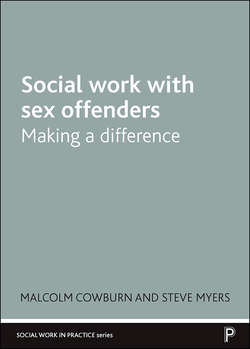Читать книгу Social Work with Sex Offenders - Cowburn Malcolm - Страница 9
На сайте Литреса книга снята с продажи.
Underpinning value base of the book
ОглавлениеSocial work values are concerned with respect for the individual; these values recognise the equal moral worth of every human being. Social work practice seeks to respect and sustain individual dignity. Closely linked to this is social work’s commitment to social justice; unlike most professions, social work explicitly includes the social context in its statement of values (IFSW and IASSW, 2004). Social justice in the context of sex crimes is a central concern of this book. This has implications for the language we use and the way in which we construct not only social work and the social worker, but also sex crimes, the people that commit them and the people that are harmed by them.
To aspire to social justice requires scrutiny of the knowledge(s) that underpin the formulation of social policy and the development of penal practices. Most sex crimes are never reported and most people who inflict sexual harm on others are unconvicted, yet public concern about ‘sex offenders’ is high. Social and penal policy is shaped around what is known about convicted sex offenders. This knowledge is necessarily partial and limited, yet these limitations are rarely acknowledged.
A commitment to social justice carries a requirement to understand sexual harm through a range of academic disciplines, including sociology, anthropology and psychology. Our understanding of sexual harm is summarised thus:
■ Men and/or boys commit most, but not all, sex crimes. In most societies, and communities, culture and values privilege male power and denigrate women and girls (patriarchy). Such cultures are supportive of sex crimes and minimise both the extent and the harm caused by sex crimes.
■ People who sexually harm others can be male, female or have indeterminate gender. They can be of any ethnicity, social class or faith group. Many offenders may not have a faith. They can have any sexuality. Sexually harmful behaviour can be demonstrated by children and young people even when they are below the age where this is legally a crime. Intellectual and physical ability is no determinant of whether or not someone becomes a sexual offender.
■ Victim-survivors of sexual harm can be male, female or have indeterminate gender. They can be of any ethnicity, social class or faith group. Many victim-survivors may not have a faith. They can be of any age or sexuality. They can be of various learning and physical abilities.
This book adopts a challenging approach in relation to some of the conventional forms of knowledge surrounding sex offending and sex offenders. Throughout the book, we highlight the importance of critically examining the values that underpin both knowledge of, and practice with, sex offenders; nowhere is this more important than in the language we use to discuss sexual harm, the people that perpetrate it and the people who are hurt.
